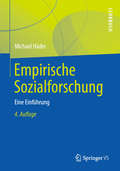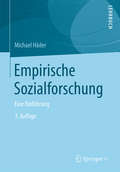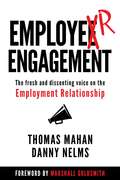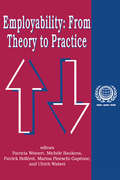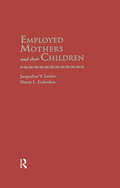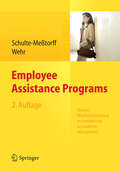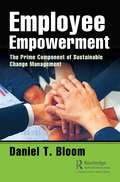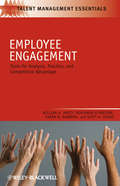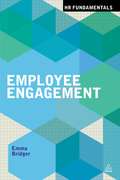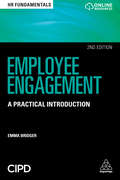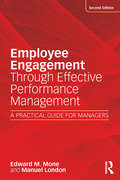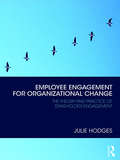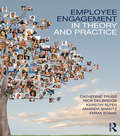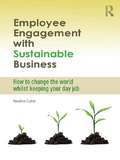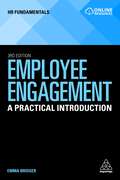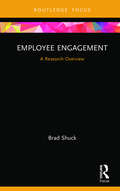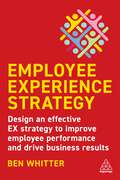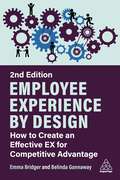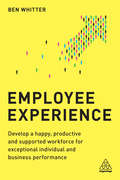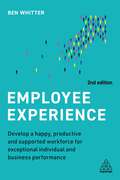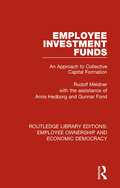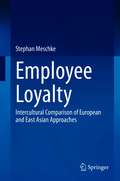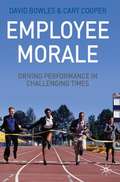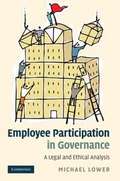- Table View
- List View
Empirische Sozialforschung: Eine Einführung
by Michael HäderSozialwissenschaftliche Methoden wie Befragungen, Beobachtungen und Inhaltsanalysen kommen in der Marktforschung, bei Studien zur Zeitgeschichte, in der Stadtplanung und in der Kommunikationsforschung zum Einsatz. Erst recht werden sie von Soziologen und empirisch arbeitenden Politikwissenschaftlern benötigt. Egal, ob im Rahmen der Evaluation eines Präventionsprogramms oder für die Erhebung des Gesundheitsverhaltens oder für eine Studie zur sozialen Mobilität, die sichere Handhabung des sozialwissenschaftlichen Instrumentariums ist stets die Voraussetzung, um belastbare Ergebnisse zu erzielen. Das Buch stellt wichtige Informationen für die Anwender und Entwickler dieser Instrumente zur Verfügung. Es behandelt die theoretischen Grundlagen der Methoden, die Schritte bei der Konzipierung und Umsetzung eines Projekts, die vielfältigen Varianten der Datenerhebung, die bei der Auswahl der Untersuchungseinheiten einzusetzenden Methoden ebenso wie die Prinzipien, die bei der Auswertung und Dokumentation der Befunde zu beachten sind. Mithilfe zahlreicher Beispiele gelingt eine besonders anschauliche Darstellung.In der vierten, aktualisierten Auflage hat im Rahmen der Auswahlverfahren nun auch das River Sampling Eingang gefunden, werden verstärkt auch digitale Methoden vorgestellt sowie vor dem Hintergrund der neuen Datenschutzverordnung auch die Forschungsethik und der Datenschutz aktualisiert.
Empirische Sozialforschung: Eine Einführung
by Michael HäderSozialwissenschaftliche Methoden wie Befragungen, Beobachtungen und Inhaltsanalysen kommen in der Marktforschung, bei Studien zur Zeitgeschichte, in der Stadtplanung und in der Kommunikationsforschung zum Einsatz. Erst recht werden sie von Soziologen und empirisch arbeitenden Politikwissenschaftlern benötigt. Egal, ob im Rahmen der Evaluation eines Präventionsprogramms oder für die Erhebung des Gesundheitsverhaltens oder für eine Studie zur sozialen Mobilität, die sichere Handhabung des sozialwissenschaftlichen Instrumentariums ist stets die Voraussetzung, um belastbare Ergebnisse zu erzielen. Das Buch stellt wichtige Informationen für die Anwender und Entwickler dieser Instrumente zur Verfügung. Es behandelt die theoretischen Grundlagen der Methoden, die Schritte bei der Konzipierung und Umsetzung eines Projekts, die vielfältigen Varianten der Datenerhebung, die bei der Auswahl der Untersuchungseinheiten einzusetzenden Methoden ebenso wie die Prinzipien, die bei der Auswertung und Dokumentation der Befunde zu beachten sind. Mithilfe zahlreicher Beispiele gelingt eine besonders anschauliche Darstellung.
EmployER Engagement: The Fresh and Dissenting Voice on the Employment Relationship
by Thomas Mahan NelmsThe signs of discontent are all there, yet they are ignored. Workplaces are suffering from unnecessary turnover, unfilled positions, lost customers, overworked staff, and compromised profit. Taking the guesswork out of engagement and retention, EmployER Engagement is the fresh and dissenting voice on the employment relationship.You&’ve heard it too many times: &“I&’ve got to update my résumé.&” &“I can&’t work for that jerk anymore.&” &“I&’m sick of having that carrot dangling in my face.&” &“This is a dead-end job; I&’m out.&” It happens every day. The signs of discontent are all there, yet they are ignored. Workplaces are suffering from unnecessary turnover, unfilled positions, lost customers, overworked staff, and compromised profit. Employee morale is flat, clever but empty perks continue to fail, and everyone knows that employee engagement scores are a joke. Poaching is the new best practice, and employees are bailing. Like it or not, employees have control in this high-stakes, employee-in-control market. And this employee market will continue for some time. It&’s simple demographic science. US workers will hold the hammer for years to come. Here&’s the deal, employer: There are plenty of people to do all the work that needs to be done; they&’re just working somewhere else. Employees don&’t need you; you need them. So how can you recruit the best employees and keep them working for you? The answer is clear: companies CAN and MUST become better employers. Taking the guesswork out of engagement and retention, EmployER Engagement is the fresh and dissenting voice on the employment relationship.
Employability: From Theory to Practice
by Michele BaukensIn the struggle against unemployment and marginalization, employability has become the one major tool to counteract this phenomenon. Those who have no chances to develop or enhance their employability will fail in the competitive labor market of the new economic order. While the notion of employability is not exactly new, the weight now being placed upon it is new: to equip job seekers for the far-reaching changes currently taking place in the economy and the world of work. What is at stake? Is employability an instrument for the regulation of the labor market, distinguishing between the employable and the unemployable? Or is it a set of measures to facilitate the insertion or reinsertion of workers into the workforce? Is employability in the future the defining policy framework for labor market policies? What are the consequences of such a development for policy makers? Employability: From Theory to Practice addresses these questions. Its internationally renowned authors provide a valuable contribution to the conceptual and operational content of the notion of employability. The form and content of measures of employability vary by state, but represent a general trend. Part 1 deals with the concepts and instruments of employability. Part 2 evaluates measures implemented in a number of countries to improve employability of job-seekers. The countries involved are the UK, the Netherlands, Belgium, Ireland, New Zealand, Poland, and Slovakia. Part 3 showcases a practical approach with Canada, which in 1996-97 moved from an unemployment to an employment insurance. This volume shows both the possibilities and limitations of measures to promote employability. It helps clarify complex policy questions which will contribute to a better understanding of the concept for policy makers and administrators. It will help policy makers, professionals, and scholars assess current trends in the workplace.
Employed Mothers and Their Children
by Jacqueline V. Lemer; Nancy L. GalambosIn 1969 the author wrote a letter to Science protesting the unfair treatment of academic mothers, who were expected to work full-time. Her problem with balancing work and family life was typical of the problems of most young parents in the United States. More than 20 years later, the same problems have not been solved, even though more than twice as many families are headed by a fully-employed parent or parents. In this volume, the authors survey the many problems of employed parents and their children. Documenting problems by sound research and pointing to the future solutions is a valuable contribution to the psychological literature.
Employee Assistance Programs: Externe Mitarbeiterberatung im betrieblichen Gesundheitsmanagement
by Claudia Schulte-Meßtorff Peter WehrPsychische Probleme sind heute der Grund Nr. 1 für weiter steigende Krankenstände und Arbeitsausfälle quer durch alle Branchen, und die Arbeitsbedingungen in unseren Betrieben sind in der gesellschaftlichen Diskussion als Ursache für diese Entwicklung weiter im Fokus. Mit einer Verschärfung der Situation in den letzten Jahren sind auch das Problembewusstsein bei Personalverantwortlichen sowie die Anzahl der Betriebe, die sich für die Gesundheit ihrer Mitarbeiter engagieren, weiter gestiegen. Eine konkrete Methode zur Erhaltung der Mitarbeitergesundheit, die "externe Mitarbeiterberatung" - im englischen Sprachraum seit vielen Jahren als "Employee Assistance Programs" bekannt -, rückt dabei mehr und mehr in den Fokus. Darunter versteht man einen Service, den Unternehmen ihren Mitarbeitern zur Verfügung stellen, um diese in diversen - beruflichen wie privaten - Belangen durch einen externen Berater zu unterstützen. Dieses Buch stellt neben Grundlagen zu psychischen Störungen, aktuellen Statistiken etc. die "neue" Methode kompakt und praxisnah vor, beschreibt ihre Implementierung ins betriebliche Gesundheitsmanagement, betriebliche Voraussetzungen und ihren Nutzen und Qualitätsanforderungen. Abschließend wird ein Business-Case für den Einsatz eines EAP-Programms im Unternehmen dargestellt sowie die Praxis der Mitarbeiterberatung am Beispiel einer Beratung per Telefon. - Für Gesundheitsverantwortliche in Unternehmen, Personalleiter und Geschäftsführer.
Employee Empowerment: The Prime Component of Sustainable Change Management
by Daniel BloomOne of the major discussions in the business world is: How do we get our human capital assets more engaged in the organization? Current Gallup Polls state that 85% of our employees are not engaged within their organizations. Employee Empowerment fully analyzes this workplace condition, which is a major concern for most CEOs. The solution proposed by this book is the introduction of the TLS (Theory of Constraints - Lean - Six Sigma) Continuum Empowerment model, which comprises three levels of empowerment – Management, Cross-Functional Team, and Individual. The first is the empowerment that comes from upper management to the organization as a whole. The second level is the empowerment that comes from the various cross-functional teams and the final level is from the individuals themselves through their ability to take ownership in the processes in which they are involved. The end solution in the book is that if we can get the human capital assets to take ownership of the processes (that is, empower the front-line employees), it will increase the level of engagement. If they become more engaged they will empower the organization at all levels to introduce sustainable change management to resolve problems within the organization. One of the tools of individual empowerment is the use of the Six Sigma toolbox. This book makes the case that when human capital assets take ownership of the processes, then we have greater engagement, and thus a more empowered organization.
Employee Engagement
by William H. Macey Benjamin Schneider Karen M. Barbera Scott A. YoungProviding both practical advice, tools, and case examples, Employee Engagement translates best practices, ideas, and concepts into concrete and practical steps that will change the level of engagement in any organization. Explores the meaning of engagement and how engagement differs significantly from other important yet related concepts like satisfaction and commitmentDiscusses what it means to create a culture of engagementProvides a practical presentation deck and talking points managers can use to introduce the concept of engagement in their organizationAddresses issues of work-life balance, and non-work activities and their relationship to engagement at work
Employee Engagement
by Emma BridgerAchieving employee engagement is crucial to the success and continued high performance of any organization. But with budgets tighter than ever before, economic struggles and an increasingly stressful workplace for staff, it has become an increasingly difficult task. Aimed at HR practitioners and managers, Employee Engagement offers a complete, practical resource for understanding, measuring and building engagement. Grounded in engagement theory and an understanding of psychology combined with practical tools, techniques and diagnostics, this book will help you assess and drive engagement in your organization. Case studies include British Gas, Capital One, Asda, Ministry of Justice, Mace and RSA
Employee Engagement (Hr Fundamentals Ser. #10)
by Emma BridgerAn engaged workforce is critical to the high performance and success of any organization. Employee Engagement offers a complete, practical resource for understanding and creating an effective engagement strategy that is aligned to wider business objectives. Supported by a variety of practical tools, features and templates, as well as numerous real-life examples and case studies from organizations such as AXA PPP Healthcare, Capital One, Charles Stanley, EDF Energy and Marks & Spencer, this handbook provides comprehensive coverage of all stages of the engagement process, from planning initiatives to building and measuring their success. <P><P> This updated second edition of Employee Engagement considers the increasing use of technology in engagement, the role and importance of purpose and trust and the relationship between employee experience and engagement and is supported by a suite of new online resources. <P> HR Fundamentals is a series of succinct, practical guides for students and those in the early stages of their HR careers. They are endorsed by the Chartered Institute of Personnel and Development (CIPD), the UK professional body for HR and people development, which has over 145,000 members worldwide.
Employee Engagement Through Effective Performance Management: A Practical Guide for Managers
by Manuel London Edward M Mone Edward M. MoneThis book is a practical guide for managers to increase and support employee engagement through stronger performance management tools and techniques. In this second edition, Edward Mone and Manuel London incorporate new developments in the field, including discussion of issues about the value of challenging goals, annual formal appraisals, forced ranking, and ways to give constructive feedback. The authors expand the traditional notion of performance management to include building trust, creating conditions of empowerment, managing team learning, and maintaining ongoing straightforward communications about performance, all of which are critical to employee engagement. Case studies offer concrete examples, and checklists and surveys supply managers with ways to assess employee engagement as well as directions for increasing engagement. An up-to-date, straightforward guide, this book is appropriate for graduate students in Employee Engagement, Human Resources, and Management Studies, as well as scholars and practitioners in those fields.
Employee Engagement for Organizational Change: The Theory and Practice of Stakeholder Engagement
by Julie HodgesThe success of organizational change in a world of increasing volatility is highly dependent on the advocacy of stakeholders. It is the link between strategic decision-making and effective execution, between individual motivation and product innovation, and between delighted customers and growing revenues. Only by engaging stakeholders does change have a chance to be successful. This book presents a coherent and practical view of how organizations might engender engagement with organizational change within their operational, tactical and strategic practices. It does this by providing a comprehensive review of the theoretical and empirical works on engagement and change from a variety of academic and practical perspectives. The academic research presented in this book is reinforced by research from consultancies as well as insights from practitioners that provide timely evidence. Ultimately the aim is to help raise awareness of the need to foster engagement with OC through a stakeholder perspective and how this can be done successfully within organizations across the globe. Employee Engagement for Organizational Change is a valuable textbook for advanced undergraduate and postgraduate students of organizational change, employee engagement, human resource management and leadership. Its balance of theory and practice also makes it a reliable resource for HR and organizational development practitioners.
Employee Engagement in Theory and Practice
by Rick Delbridge Kerstin Alfes Amanda Shantz Emma Soane Catherine TrussIn recent years there has been a weight of evidence suggesting that engagement has a significantly positive impact on productivity, performance and organisational advocacy, as well as individual wellbeing, and a significantly negative impact on intent to quit and absenteeism from the work place. This comprehensive new book is unique as it brings together, for the first time, psychological and critical HRM perspectives on engagement as well as their practical application. Employee Engagement in Theory and Practice will familiarise readers with the concepts and core themes that have been explored in research and their application in a business context via a set of carefully chosen and highly relevant original and case studies, some of which are co-authored by invited practitioners. Written in an accessible manner, this book will be essential reading for scholars in the field, students studying at both undergraduate and postgraduate levels, as well as practitioners interested in finding out more about the theoretical underpinnings of engagement alongside its practical application.
Employee Engagement with Sustainable Business: How to Change the World Whilst Keeping Your Day Job (Routledge Explorations in Environmental Studies)
by Nadine ExterSustainability is, and continues to grow as, a key issue for organizations: in the board room; with investors, customers and regulators; and from employees whose demands on organizations include improving their social and environmental performance in return for loyalty and commitment. However, as well as employees being a driver for organizations to embrace corporate sustainability, employees are also one of the most critical assets in enabling an organisation to understand and be able to deliver to its economic, social and environmental responsibilities. Research shows that employees of all types are vital in the pursuit of sustainability, however, to date there is no one source that shows all of these identified types of employees and how they are involved in the sustainability process. This book fills that gap with interviews and case studies for each type of employee, as well as up-to-date research and analysis of the critical role of ‘social intrapreneurs’ and leaders within organisations. The book uses real life examples along with the latest research in an informative and accessible style. Management theory is used throughout – such as motivation, leadership skills and organisational behaviour – but this is discussed through examples, rather than in a theoretical manner. This book will provide insight, examples and advice on the different types of employees who are, and can, contribute to a sustainable world via the organisation they work for: what they are doing from within the organization to contribute to societal, economic and environmental sustainability.
Employee Engagement: A Practical Introduction (HR Fundamentals #24)
by Emma BridgerHow can I create engagement strategies that will empower employees to succeed? This book offers a practical resource for developing an effective engagement strategy aligned to business objectives.An engaged workforce is essential to the performance and success of any organization. Featuring practical tools and templates, Employee Engagement provides comprehensive coverage of all stages of the engagement process, from planning initiatives to building and measuring their success.This updated third edition presents engagement strategies that account for recent workplace developments, from remote working to creating psychological safety. It also includes updates on the evolving technology trends that impact engagement and guidance on how to create strategies that are inclusive of all employees. With examples and case studies from organizations such as AXA PPP Healthcare, EDF Energy and Marks & Spencer, Employee Engagement is essential reading for HR students and professionals. Online supporting resources include diagnostic tools, templates and additional best-practice case studies.HR Fundamentals is a series of succinct, practical guides featuring exercises, examples and case studies. They are ideal for students and those in the early stages of their HR careers.
Employee Engagement: A Research Overview (State of the Art in Business Research)
by Brad ShuckThe field of employee engagement has experienced unprecedented growth over the last three decades. Despite remarkable progress in both practice and scholarship, there remains tremendous confusion about what employee engagement is, what it means, and how organizations can take proactive steps to harness the full power of an engaged workforce. This short-form book provides readers a unique and research-based road map through the rapidly evolving research around employee engagement, including the identification of key literature and theory along with expert, timesaving connections to how theory has informed practice. The author covers the various disciplinary approaches and schools of thought, thematically bridging scholarly literature – including and identifying the historically significant and most current – to better understand how the research is evolving and what new opportunities for scholarship are emerging. Essential reading for scholars of human resource management, leadership and management more broadly, the book is also a valuable read for reflective practitioners globally.
Employee Experience Strategy: Design an Effective EX Strategy to Improve Employee Performance and Drive Business Results
by Ben WhitterDesigning and implementing an exceptional employee experience strategy is crucial for business success. From a leading figure in the EX field, this book provides everything needed to succeed.Employee Experience Strategy explains how to assess the needs of the organization and its employees, define and build an effective employee experience (EX) strategy and embed it successfully in the business. There is also guidance on how to get stakeholder buy-in from the rest of the business, and make sure that the EX strategy works for remote, hybrid and in-person working. It also covers how to overcome common challenges and measure the ROI of the strategy. Most importantly, this book shows how to ensure that the EX strategy delivers on the financial and performance goals of the business. This book is underpinned by primary data, research and global case studies from organizations including L'Oréal, Sanofi, and Unilever. There are also practical examples throughout and interviews with leading figures who have successfully implemented a robust employee experience strategy. Written by Ben Whitter who was recognized by Thinkers50 in 2021 specifically for his work in employee experience, this is an essential book for all senior talent professionals needing to build, embed and sustain an effective EX strategy.
Employee Experience by Design: How to Create an Effective EX for Competitive Advantage
by Emma Bridger Belinda GannawayIn a world adapting to continuous change and disruption, delivering a great employee experience is vital. How can organizations create an experience that enables their people to thrive; an experience that unlocks productivity and creates competitive advantage?Employee Experience by Design is a practical guide for HR professionals, business leaders and anyone needing to create an employee experience that empowers people to perform at their best. By setting out simple steps that any team or organization can follow, it demystifies EX, and shows how to design an exceptional experience for employees. Drawing on positive psychology, the book demonstrates what a good workplace experience means for people. A world away from perks and benefits, the authors show how to discover what really drives an excellent EX. They then walk through a user-friendly framework covering all levels of EX, from organizational culture to people processes and everyday behaviours. Employee Experience by Design shows how to build a robust business case for employee experience and align EX activity with organizational strategy to demonstrate impact. Readers will also learn how to measure EX and demonstrate return on investment. Packed with clear and practical tips, tools, and examples from organizations including ING, Expedia Group and ADEO, this book is essential reading for anyone looking to develop a happy, productive, high-performing environment in which people can excel.
Employee Experience by Design: How to Create an Effective EX for Competitive Advantage
by Emma Bridger Belinda GannawayDelivering a great employee experience is crucial, but how can organizations create an experience that enables their teams to unlock their potential and thrive? Drawing on positive psychology and design principles, Employee Experience by Design is the practical guide for HR and OD professionals, business leaders and all those needing to create an employee experience that empowers people to perform at their best. This new edition sets out simple but effective steps any team or organization can follow. Sharing tools to measure employee experience (EX) and demonstrate return on investment, this book shows how to build a robust business case for employee experience and align EX activity with organizational strategy. This updated guide showcases EX design through a user-friendly framework covering all levels of EX, from company culture to people processes. This new edition is packed with tips, tools and examples from organizations, including ING, Expedia Group and Adeo. It is essential reading for anyone looking to develop a healthy, high-performing workplace where people can excel.
Employee Experience: Develop a Happy, Productive and Supported Workforce for Exceptional Individual and Business Performance
by Ben WhitterFor organizations to maintain their competitive advantage, their people need to be performing to the best of their abilities. However, in a world of increasing stress and pressure, of rapid technological change and digital overload, supporting and developing employees has never been more difficult. To develop top performing employees, HR professionals need to move beyond ad hoc engagement initiatives to design and embed employee experience throughout an organization's processes and culture from the moment an employee sees a job advert to the moment they leave the company. Employee Experience is a practical guide to achieving this. Employee Experience is full of tools, tips and advice to help HR professionals and business leaders motivate, support and develop their staff to achieve exceptional individual and organizational performance. With guidance on how to build experience capabilities in an HR team and coverage of how to define, design and embed an employee experience strategy to ensure that each interaction an individual employee has with the company supports this experience, this is essential reading for HR professionals. Including case studies from companies including Airbnb, Sky and Starbucks, this book shows how adopting this approach have improved performance, productivity and profits and how organizations of any size can achieve this success too.
Employee Experience: Develop a Happy, Productive and Supported Workforce for Exceptional Individual and Business Performance
by Ben WhitterIn a world of increasing stress and constant change, supporting and developing employees has never been more difficult. Employee Experience is an essential resource for improving experiences at work.To develop top-performing employees, HR professionals need to move beyond ad hoc engagement initiatives and instead to design and embed employee experience throughout an organization's processes and culture - from the moment an employee sees a job advert to the moment they leave the company. Employee Experience includes guidance on how to build experience capabilities in an HR team and on communicating, sustaining and evolving the employee experience, as well as on using networks, nudges and technology. The second edition features evidence-based research on the most common challenges experienced globally and how a holistic approach to employee experience can solve them. There is updated coverage of questions that should be asked of data to help put people and their experiences at the heart of the organization and new case studies. Full of tools, tips and advice, this book shows how focusing on the employee experience improves performance, productivity and profits and how organizations of any size can achieve this success.
Employee Investment Funds: An Approach to Collective Capital Formation (Routledge Library Editions: Employee Ownership and Economic Democracy #5)
by Rudolf Meidner Anna Hedborg Gunnar FondOriginally published in 1978. The present study had grown out of the deliberations of wage policy at the 1971 Congress of LO, the Swedish Confederation of Trade Unions. For many years the LO had pursued a policy of solidarity in wage policy – a policy which sought to relate pay to the nature of the work which an employee carried out, and not to the capacity or ability of the employer to pay. Several issues related to this policy are explored. This study was extremely controversial when first published in Sweden, and will therefore be of great interest to students of economic history and democracy.
Employee Loyalty: Intercultural Comparison of European and East Asian Approaches
by Stephan MeschkeThis book aims to provide a deeper understanding of the concept and negative outcomes of employee loyalty, considering employees in organizations and OB theory, and comparing employee experiences across both European and East Asian cultures. Through an international analysis of employee loyalty within the service industry, the author highlights the importance of this highly relevant but often overlooked topic to addressing practical issues such as conflict solution, employee retention, service mentality, and work effort. Building on a clear definition and evaluation of the concept of employee loyalty, this book explores meaningful theoretical and practical implications of employee views of the organization, working group, and supervisor.
Employee Morale
by David BowlesPerformance is the key outcome of high morale, and the reason why it should be taken so seriously: with research gathered from some of the world's largest employee opinion databases and best academic centres, the authors lay out the morale-performance connection. Now raised from just 'touchy-feely' to 'mission critical', employee morale is finally getting the attention which it deserves. As it does, organizations are changing everything from their structure to their processes to take account of this fact, and starting to manage themselves around the need to measure and improve morale on an ongoing basis. Starting with the hiring process, to every single promotion, and via ongoing methods which the authors examine in detail, morale is increasingly the focus, high morale the goal. Check out Cary Cooper's Blog: http://carycooperblog. com/ Check out David Bowles' Blog: www. davidbowles. wordpress. com
Employee Participation in Governance
by Michael LowerThe rights of the employee and the themes of employee ownership and participation have been central, recurring themes as the body of Catholic Social Thought has developed. There is now a unified corpus of official Catholic teaching that focuses the resources of moral theology and natural law theory on the important social issues of the day such as this. The description and explanation of the essential elements of Catholic Social Thought and its relationship to these themes helps the reader think about the place of the corporation in the economy and whether British and European corporate governance and labour law do what they should to put the employee at the centre of corporate governance.
